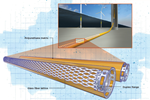Base Materials subsea buoyancy foams earn DNV type approval
Low-density syntactic foams have been qualified for use in 11,500-meter ocean depths in addition to approval of manufacture.
Source | Base Materials
(Leicester, U.K.) announces that it has become the first subsea buoyancy syntactic foam manufacturer to receive DNV (Høvik, Norway) type approval (TAC) on its Subtec 11500 material and Approval of Manufacture (AoM) for the complete range of Subtec materials.
Following rigorous testing by DNV, Base Materials’ Subtec 11500 syntactic foam is now qualified for use in seawater depths between 2,000 and 11,500 meters. In addition, the Subtec materials range — comprised of seven material grades — now has DNV AoM.
According to the company, this milestone highlights the Subtec’s quality and high performance. The buoyancy materials are comprised of high-grade hollow glass microspheres and a thermoset polymer matrix. Offered in a range of 400-650 kg/m3 densities, they are formulated to “produce ultra-high strength-to-weight characteristics with excellent water ingress resistance,” making them well suited for subsea applications including crewed and uncrewed vehicles. Each grade in the range is color-coded to ensure depth ratings match within buoyancy assemblies.
“When it comes to the deepest and most critically rated subsea applications, the performance of materials and equipment alike are mission-critical for both crewed and uncrewed subsea vehicles,” Stephen Sloan, head of commercial at Base Materials, says. “As such, we were delighted to work closely with DNV across the stringent testing of our Subtec 11500 buoyancy material. The approval showcases the unquestionable quality and robustness of the material. Additionally, it highlights our commitment to continually investing in R&D to provide innovative materials that set the standard in even the most critical applications.”
DNV is a global classification body that delivers testing, certification and technical advisory services to the maritime industry. DNV certification provides assurances that the products and services accredited meet the regulatory and safety standards required for the end-use applications.
Related Content
-
Developing bonded composite repair for ships, offshore units
Bureau Veritas and industry partners issue guidelines and pave the way for certification via StrengthBond Offshore project.
-
Al Seer Marine, Abu Dhabi Maritime unveil world’s largest 3D-printed boat
Holding the new Guinness World Record at 11.98 meters, the 3D-printed composite water taxi used a CEAD Flexbot to print two hulls in less than 12 days.
-
Evolving natural fiber technology to meet industry sustainability needs
From flax fiber composite boats to RV exterior panels to a circularity model with partnerships in various end markets, Greenboats strives toward its biomaterials and sustainable composites vision in an ever-changing market.






